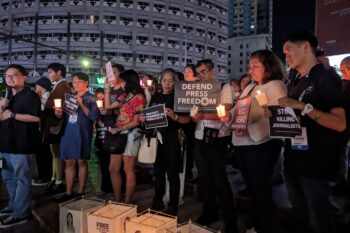NEW BATAAN, Compostela Valley (MindaNews / 04 December) – Ten years after super typhoon Pablo, the public cemetery here looks like a subdivision with mausoleums of the same design dominating the landscape. But there are four concrete “apartment-type” vaults that stand out,. Apparently neglected and blackened by moss, they contain the remains of at least 324 victims of the flash floods and debris flow that slammed across this town on December 4, 2012, remains that 10 years later, are still awaiting claimants.
Like other disaster sites in the country, the unidentified dead are known only by their numbers. In the cities of Iligan and Cagayan de Oro after typhoon Sendong in 2011, many of the numbers have faded.
New Bataan is no exception.
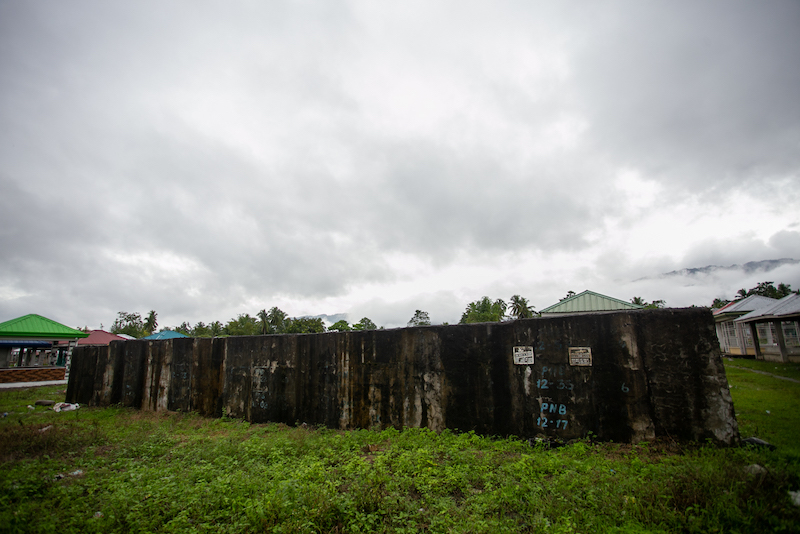 The remains of at least 324 persons were buried in four concrete “apartment-type” vaults such as this in the public cemetery in New Bataan. They remain unidentified ten years after super typhoon Pablo. MindaNews photo by MANMAN DEJETO
The remains of at least 324 persons were buried in four concrete “apartment-type” vaults such as this in the public cemetery in New Bataan. They remain unidentified ten years after super typhoon Pablo. MindaNews photo by MANMAN DEJETO
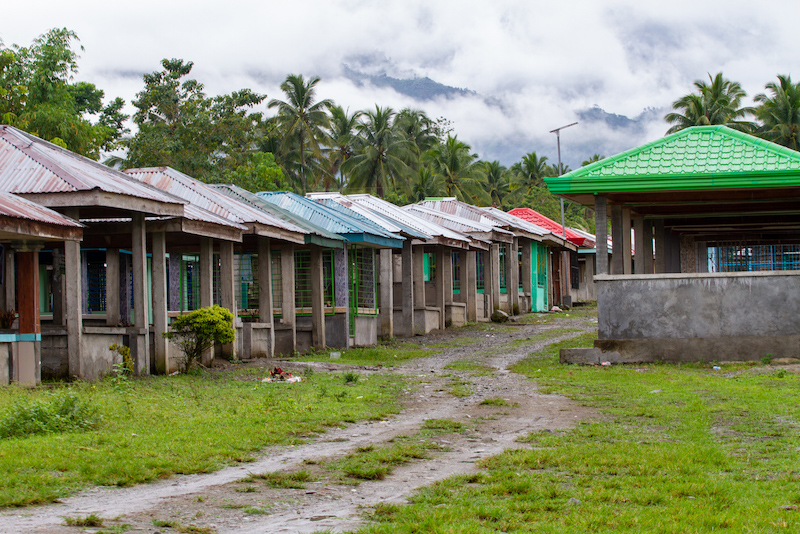 From afar, the public cemetery in New Bataan, Compostela Valley province, now looks like asubdivison with mausoleums of the same design dominating the landscape. MindaNews photo by Manman Dejeto
From afar, the public cemetery in New Bataan, Compostela Valley province, now looks like asubdivison with mausoleums of the same design dominating the landscape. MindaNews photo by Manman Dejeto
Here, the unidentified victims are known by the numbers assigned to them, preceded by the code “PNB-12” for “Pablo New Bataan 2012.”
DNA samplings had been taken from these “numbers” and they were supposed to have been matched with the DNA of surviving relatives. If the DNA results find a match, the victim ceases to be a number and regains his / her identity.
Relatives who had their DNA tests taken were promised by the Disaster Victim Identification (DVI) of the National Bureau of Investigation (DVI) that the test results would be out after six months. In October 2014, they were still waiting for results. That same month, the social welfare chief of Cagayan de Oro City, Teddy Sabuga-a, told MindaNews they were still waiting for results of the DNA matching with relatives of the victims of Sendong. He said he was told by an NBI official in Cagayan de Oro that the matching could not be processed due to lack of reagents. Sendong happened in December 2011, a year before Pablo.
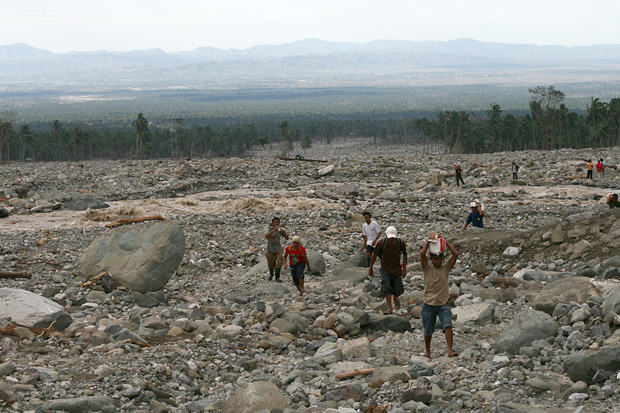 What was once the center of Barangay Andap in New Bataan, Compostela Valley province on 5 December 2012, a day after super typhoon Pablo stroked this town.. Mindanews file photo by RUBY THURSDAY MORE
What was once the center of Barangay Andap in New Bataan, Compostela Valley province on 5 December 2012, a day after super typhoon Pablo stroked this town.. Mindanews file photo by RUBY THURSDAY MORE
A Philippine Star report on July 1, 2014 quoted the NBI’s ante-mortem team leader Nicasio Botin as saying each DNA sampling costs P20,000.
Sabuga-a served as social welfare officer until the third term of Mayor Oscar Moreno ended on June 30, 2022. He told MindaNews on Sunday that until their term ended, he had not received information on the Sendong DNA results.
In New Bataan, Marlon Esperanza, former information officer, now tourism officer, told MindaNews on Sunday that ten years later, “wala pa gihapon result ng DNA test.”
Esperanza sent MindaNews a list on February 11, 2014, containing 22 names of residents making follow-up on the results of the DNA matching with 38 of their missing loved ones.
But after having been repeatedly told the NBI has not released the results, eventually, the relatives stopped following up. “Murag wala na sila naglaum ana” (I think they have lost hope), Esperanza said.
But relatives of two young boys aged 8 and 14, did not wait for the NBI to release the results. By November 1, 2013, they claimed a spot between the numbered niches – between PNB 12-52, PNB 12-53, PNB 12-54 and PNB 12-34, PNB 12-35 and PNB 12-36 — and there attached the lapida (grave marker) of their loved ones.
In memory of
Jun Mark A. Alcano
Born Feb. 18, 1998
Died Dece. 4, 2012
From loving family
A few inches away, this marker:
In memory of All Soul
Specially to Charlie A. Traya
Born: Oct. 17, 2004
Died: Dec 4, 2012
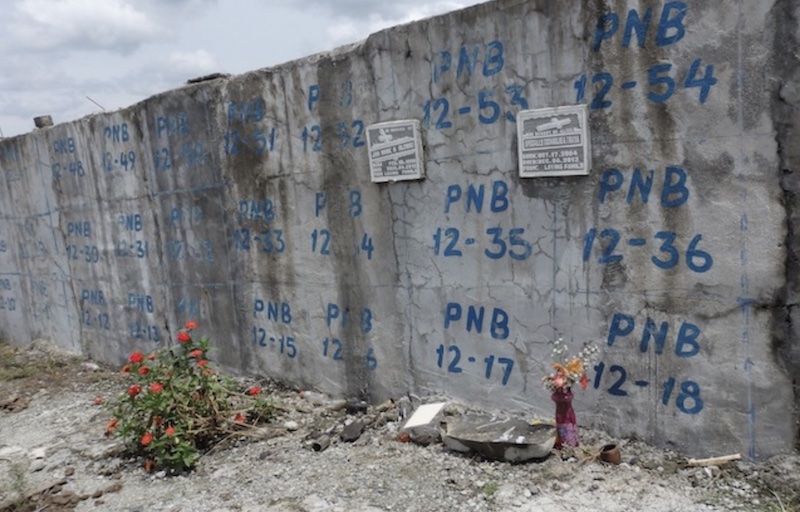 Instead of waiting for the results of the DNA matching test, relatives of two young boys decided to claim a spot where they could put the grave marker. File photo taken 1 November 2013 by CAROLYN O. ARGUILLAS
Instead of waiting for the results of the DNA matching test, relatives of two young boys decided to claim a spot where they could put the grave marker. File photo taken 1 November 2013 by CAROLYN O. ARGUILLAS
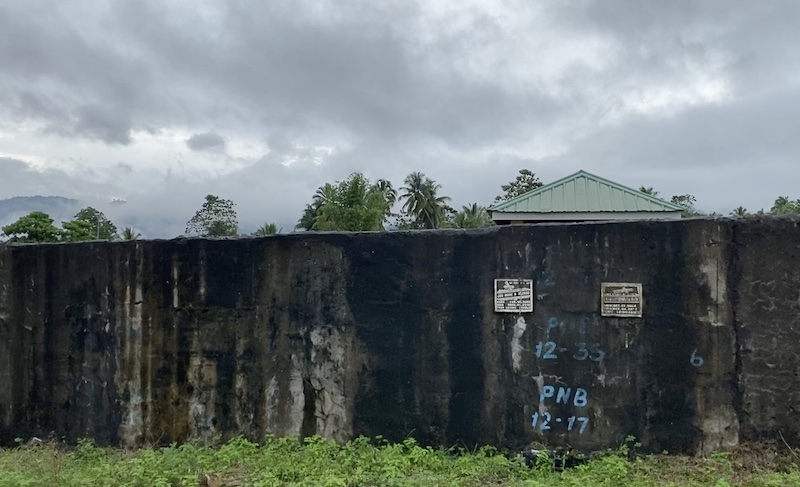 Photo taken on 1 December 2022 by CAROLYN O. ARGUILLAS
Photo taken on 1 December 2022 by CAROLYN O. ARGUILLAS
Elsewhere in New Bataan, the terrifying boulders and rocks in Barangay Andap that destroyed lives and property ten years ago have been covered with grasses, shrubs and trees, like a mini forest on both sides of what used to be the New Bataan to Maragusan highway, beyond the San Roque chapel, past the concrete marker or “Wall of Remembrance” that bears the names of the hundreds of dead and missing.
Destroyed by the debris flow ten years ago, this highway led to the mountain resorts that were also swept away by the rampaging floodwaters, boulders, rocks , houses and uprooted trees.
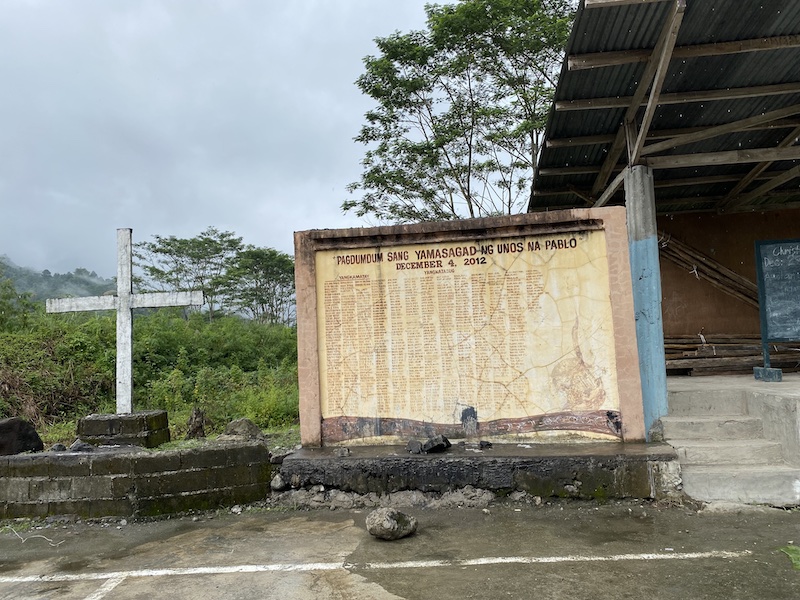 Wall of Remembrance in Barangay Andap, New Bataan, Compostela Valley on 1 December 2022. MindaNews photo by CAROLYN O. ARGUILLAS
Wall of Remembrance in Barangay Andap, New Bataan, Compostela Valley on 1 December 2022. MindaNews photo by CAROLYN O. ARGUILLAS
There is a new highway now that leads to new resorts. New Bataan is back as a tourist destination. An eco-adventure challenge has been scheduled on the third week of December.
In Purok 4, Barangay Poblacion, the huge boulder where ten years ago MindaNews chanced upon young boys playing — among them Lowiemar Alcano, who was buried up to the neck when his uncle found him — still stands where it got, but is now covered with moss and lichen.
Lowiemar, now 17, was in school when MindaNews visited last Thursday. “Grade 12 na siya,” his mother said.
A farmer who lost his wife to super typhoon Pablo says Typhoon Agaton which struck in April this year, brought additional rocks to the area where houses have been built even if this had been declared as no build-zone.
He said he was given a house in a relocation site but there is no source of livelihood there.
In Barangay Andap, on the road past the ‘Wall of Remembrance,’ houses have been constructed, too, again, in a supposedly no-build zone.
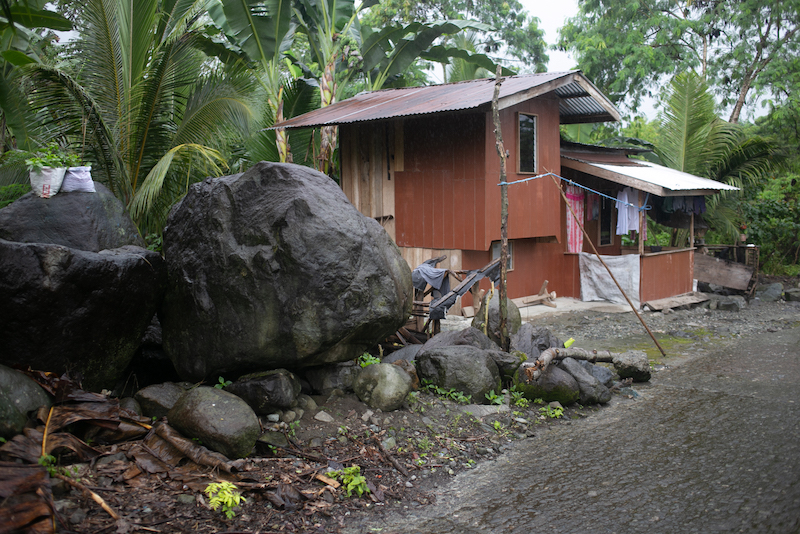 Several houses have been constructed in Barangay Andap in what is supposed to be a no-build zone. There is no source of livelihood in the relocation sites, they said. MindaNews photo by Manman Dejeto
Several houses have been constructed in Barangay Andap in what is supposed to be a no-build zone. There is no source of livelihood in the relocation sites, they said. MindaNews photo by Manman Dejeto
A female occupant in one of the houses claimed they stay there only at daytime. Like the farmer in Purok 4, she also has a house in a relocation site but cannot raise chickens and pigs there. She said she comes here for livelihood. (Carolyn O. Arguillas / MindaNews)
